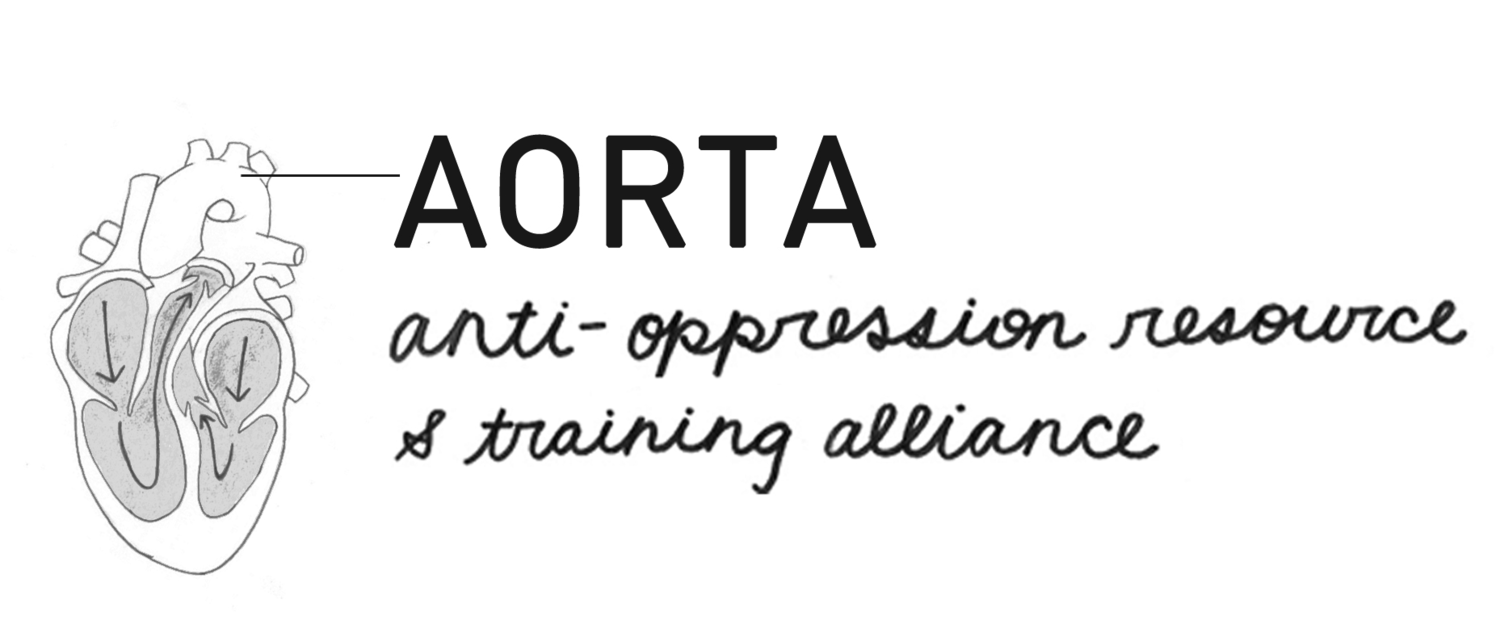Continuum on Becoming a Transformative Anti-Oppression Organization
Adapted by AORTA from Crossroads Ministries “Continuum on Becoming an Anti-Racist Multicultural Organization”
This resource is best accessed by downloading the PDF (above), but text is posted below for screen-reader accessibility.
Exclusionary Institution
Intentionally and publicly excludes or segregates people of color, indigenous people, immigrants, women, LGBTQ people, poor and working class people, and/or disabled people.
Intentionally and publicly enforces oppressive belief systems throughout institution.
Institutionalization of oppression includes formal policies and practices, teachings, and decision making on all levels.
Openly maintains the dominant group’s power and privilege (white people, men, straight people, cisgender people, rich and middle class people, able bodied people).
Tokenizing Institution
Tolerant of a limited number of “token” people from oppressed social groups so long as they have “proper” perspective and credentials.
May still secretly limit or exclude oppressed people in contradiction to public policies.
Often declares, “We don’t have a problem” as a way to silence critiques of oppressive dynamics.
Continues to intentionally maintain dominant group’s power and privilege through its formal policies and practices, teachings, and decision making on all levels of institutional life.
Monocultural norms, policies and procedures of dominant culture viewed as the “right” way.
Engages issues of diversity and social justice only on club member’s terms and within their comfort zone.
Compliance Institution
Makes official policy pronouncements regarding commitments to “diversity.”
Sees itself as “non- oppressive” institution with open doors to all people.
Sponsors “diversity trainings.”
Carries out intentional inclusiveness efforts, recruiting “someone of color,” “a LGBTQ person,” “a disabled person,” etc. on committees or office staff, but not those who “make waves.”
Little or no change in culture, policies, and decision making.
Is still relatively unaware of continuing patterns of privilege, paternalism and control.
Affirming Institution
Develops an analysis of systemic oppression.
Sponsors anti-oppression trainings and ongoing study on a range of topics.
New analysis of institutionalized power, privilege, and oppression.
Develops intentional identity as an “anti- oppressive” institution.
Begins integrating anti-oppression politics into organizational policies and governance documents.
Actively recruits and promotes members of groups have been historically denied access and opportunity to certain some sectors of the organization.
Begins to develop accountable relationships to oppressed communities.
Institutional structures and culture that maintain power and privilege critiqued but still intact and relatively untouched.
Transforming Institution
Commits to process of intentional institutional restructuring, based upon anti-oppression analysis and identity.
Audits and restructures all aspects of institutional life to ensure full participation of people of color, indigenous people, immigrants, poor and working class people, LGBTQ people, women, and disabled people including their worldview and cultures.
People more impacted by systemic oppression are involved in determining organizational structures and practices.
Actively recruits, promotes, and retains members of oppressed groups to all areas of the organization.
Commits to struggle to dismantle oppression in the wider community, and builds clear lines of accountability to oppressed communities.
Implements structures, policies and practices with transparent decision making and power sharing on all levels of the institution.
Transformative Institution
Future vision of an institution and wider community that has overcome systemic oppression.
Institution’s life reflects full participation and shared power with diverse racial, gender, and economic groups.
Members across all identity groups work in horizontal relationships to determine the organization’s mission, structure, constituency, policies and practices.
Actively works in solidarity in larger communities (regional, national, global) to eliminate all forms of oppression.
Members across all identity groups are full participants in decisions that shape the institution.
A sense of restored community and mutual caring.
